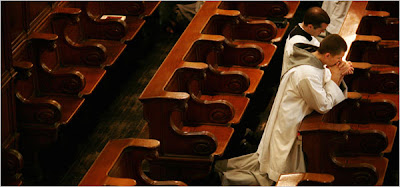While much of Catholic America is fixing its gaze on the pontiff, as he speeds his way to the U.S., this remarkable story from today’s New York Times caught my eye. It’s timed to another significant event, tomorrow’s one year anniversary of the massacre at Virginia Tech:
After their daughter, Austin, was killed in the Virginia Tech shootings last year, Bryan Cloyd and his wife, Reneé, asked that donations in her honor be sent to a program that repairs dilapidated houses in the poorest parts of Appalachia. To the Cloyds’ surprise, the program received nearly $70,000 in gifts almost immediately.
“We realized there was no better therapy than doing more of that,” said Mr. Cloyd, an accounting professor at Virginia Tech, who began organizing trips for students to work in the hollows of Virginia.
But for the Cloyds, the trips were not just an attempt to heal. They were also a chance to redefine the memory of their daughter, a process that set an example for a university still struggling to move forward as the first anniversary of the worst campus massacre in American history approached on Wednesday.
“For us, this has become a way to remember these students, many of whom were very involved in activism and service,” Mr. Cloyd said. “They should be known for how they lived rather than how they died.”
This year, the Cloyds have ushered about 150 Virginia Tech students and faculty members on five weekend house-repair trips, and they plan to continue running regular trips from now on.
In the classroom, Professor Cloyd, 47, has shifted beyond his typical focus on taxes and begun offering an honors class titled “Inventing the Future Through Our ‘Ut Prosim’ Tradition,” a reference to the university’s motto, “that I may serve.” Students in the class spend one weekend working with the house-repair project and the rest of the semester developing proposals for other types of service.
In Jonesville, the Cloyds’ efforts brought 69-year-old Louella Moore to tears.
“Honestly, I don’t know how to thank these people,” she said, shaking her head as she peered shyly through her window, watching Mr. Cloyd and his students dig holes for corner posts that would soon support her new front porch.
A year ago, Ms. Moore said, her house seemed to be caving in around her. The water heater broke, then part of the roof and the foundation started to collapse. Ms. Moore said she had little money to do anything about it. Her life, too, seemed to be closing in, she said, as a daughter died of a heart attack, a brother-in-law died of a brain tumor, and her husband died of unknown causes, all in about three years.
But Ms. Moore stopped crying when asked about the Cloyds.
“What they have gone through, and now they have started all this,” she said, wiping her eyes. “It just makes me strong.”
For the Cloyds, repairing the homes of others was a way to restore their sense of humanity, they said.
It was this message that they took to university officials late last year, encouraging them to step up efforts to get students involved in public service. In response, the university started a program in October called V.T.-Engage, which asked Virginia Tech students and faculty and staff members to perform at least 10 hours of service each, for a total of 300,000 hours, in honor of the victims of the April 16, 2007, shootings, which left 33 dead, including the gunman. Members of the Virginia Tech community have already completed more than 200,000 hours this year.
“Purpose and hope — the raw ingredients of happiness, right?” Mr. Cloyd said, taking a break from offering support to two English majors who were trying to stand firm in foot-deep mud as they steadied a 16-foot pole in concrete at a house in Lee County.
Mr. Cloyd said Austin had gone on four weeklong trips with the Appalachia Service Project when the family lived in Champaign, Ill. More than any other experience, he said, those trips shaped her desire to become an international studies major and pursue a career in social service.
By honoring Austin’s passion for social justice, Ms. Cloyd said that she had been able to stay connected to her daughter’s friends, many of whom have joined the weekend outings.
“Really, we’re the ones who benefited from all this,” she said.
There’s more at the link. You’ll want to read it. It’s an inspiration.
Photo: Bryan Cloyd, a professor at Virginia Tech whose daughter was killed in last year’s shooting. Photo by Shawn Poynter for the New York Times.

